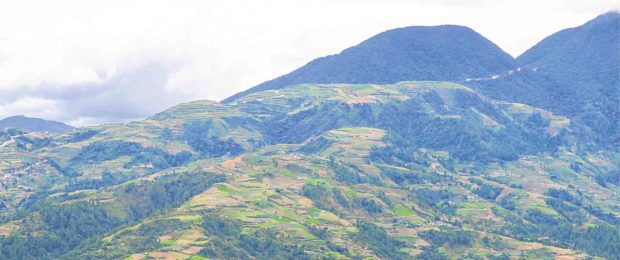Settlers, farms threaten Cordillera forest growth

MOUNTAIN FARMS Sections of Mount Data National Park at Buguias town in Benguet province are cleared to give way to vegetable farms.—KARLSTON LAPNITEN
BAGUIO CITY — Cordillera forest cover has expanded by 38,000 hectares, based on the latest data. But the watersheds remain vulnerable due to encroachment of settlers who are armed with certificates of tax declaration issued by local governments, said Ralph Pablo, Cordillera director of the Department of Environment and Natural Resources (DENR).
Addressing a recent management conference here, Pablo said comparative data and satellite images from the National Mapping and Resource Information Authority covering 2010 to 2015 showed that once open canopies spanning 38,823 ha of forest have closed.
This was also reported in the Cordillera regional development plan (CRDP) for 2017 to 2022, crediting the government’s reforestation programs for “arresting the decline in forest cover.”
But the CRDP, which was approved last year, also emphasized that the region’s mossy or old-growth forests were still under threat from the encroachment of farmers and settlers.
Land claims
Pablo blamed local governments for indiscriminately approving land claims paid through tax declarations, which were valid only for alienable and disposable lands.
More than 600 settlers at Mount Sto. Tomas forest reservation, straddling Baguio City and Tuba town in Benguet province, were legitimized when their tax declarations were honored.
This year, Tuba issued a tax declaration to claimants of a forestland on which the Philippine Military Academy had applied for expansion to build new training grounds, Pablo said.
“Local governments treat tax declarations as revenue but the cost of damage to the environment is more than the collected tax,” he said.
Local governments can resolve this problem by nullifying some of these settlements created through tax declarations.
In 2015, local governments were asked to appraise applications for land to be paid through tax declarations and avoid legitimizing claims in forest reserves and protected areas.
Legal leg
Thirteen major river basins in the Cordillera are harnessed to generate electricity for the Luzon power grid and to irrigate lowland farms.
The region, described as the watershed cradle of Luzon, also has 28 forest reserves, four national parks and a river reserve.
“If they have no tax declarations, then forest settlers have no leg to stand on legally,” Pablo said, citing his agency’s difficulties in curbing forest land intrusion.
In 2015, a writ of kalikasan issued by the Court of Appeals (CA) to protect Mount Sto. Tomas directed Tuba to stop issuing tax declarations for forestland and to prevent any form of development in the 3,121-ha reservation.
The Tuba government informed the CA that it had issued 637 tax declarations for lands inside the forest reserve since 1999.
Vegetable farms have eaten into forestlands in Benguet, Mountain Province and Ifugao provinces, according to the DENR.
The larger portions of forests converted into farms were simply occupied without tax declarations, it said.














